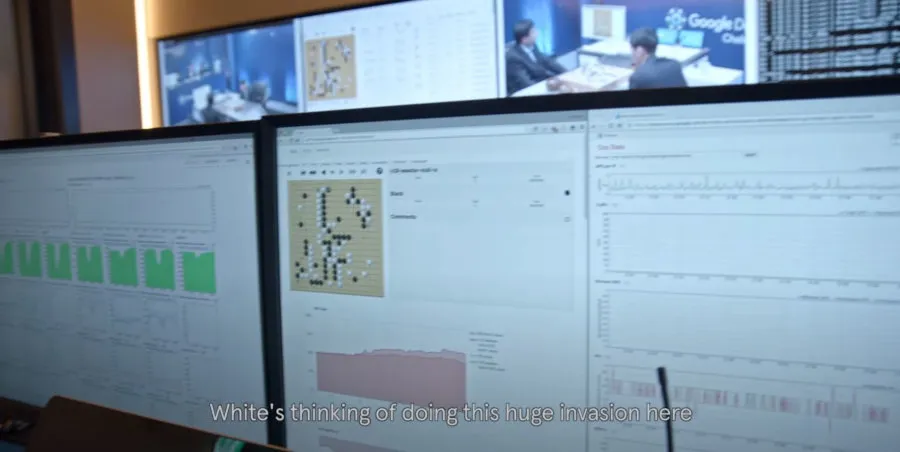This is not about the aftermath of the American general elections, even though that's a significant and crucial battle in our collective future as well. No, this post is about the 2016 confrontation between human intelligence and artificial intelligence, 20 years after the the first chess-match between IBM's Deep Blue and Garry Kasparov.

source: YouTube
Garry Kasparov won that first match of 6 games, with three going to Kasparov, one to Deep Blue and two ties. But the second match that was played the following year, was won by the AI; that was the first time in history that a computer beat a reigning chess champion, with two games going to Deep Blue, one to Kasparov and three ties. That was news of great symbolic significance at the time, as it was a sign that AI was catching up on human intelligence. Later that victory was downplayed a lot, partly by assigning Kasparov's loss to uncharacteristically poor play on the grand-master's side, and partly because Deep Blue relied on brute computational force, the capacity of making millions upon millions of calculations in very little time; that reassured us, humans, a lot because the AI wasn't really intelligent, but merely extremely fast. To just sketch how far computer programming and AI have come, Kasparov said in a 2016 discussion with neuroscientist Sam Harris that "today you can buy a chess engine for your laptop that will beat Deep Blue quite easily."
But that was chess. The ancient Chinese game of Go is a completely different beast altogether. The basic rules are simple. Each player in turn places a stone of their color (black or white) on a 19 x 19 grid (361 points or intersections), and each stone must have at least one unoccupied intersection to its left, right, top or bottom, or must be part of a connected group that has at least one such unoccupied intersection next to it; if it doesn't, that stone or group of stones is captured and removed from the board. A player may also pass, declining to place a stone, though this is usually only done at the end of the game when both players believe nothing more can be accomplished with further play. When both players pass consecutively, the game ends and is then scored.
Although the rules are deceptively simple (there are a few more then stated above), the game of Go has far more possible moves than chess and more possible board configurations than there are atoms in the entire known universe. Playing Go, being good at it, relies more on something deeply human: intuition. If you watch the below linked documentary you'll hear Lee Sedong, the multiple world champion Go player, state that he makes certain moves just because he feels it was the right thing to do. He has been playing Go since childhood and is admired by Go players around the world for his unique kind of intelligence and intuition. In the first few minutes of the documentary there's this interesting statement about the development team behind Deep Mind, the AI that beat Lee Sedong in a series best of 5 games: "It's not just that they want to understand Go, they want to understand what understanding is..."
What's most remarkable about this 2016 match and the documentary, in my opinion at least, is how the millions of viewers in the audience reacted to Lee Sedong's defeat. Everyone was stunned, for not only were most people convinced that an AI could never defeat a human mind in a game that's so reliant on such a deeply human trait as intuition, the fact that the world's greatest Go player was defeated, again makes us question where this is going; are we not building the machines that one day could be smarter than us and rule over us? So many books and films are made about this fear that we will one day be the creators of our own downfall; could those science fiction scenarios become reality in our lifetimes or that of our children? As you'll see in the documentary, not even the world's greatest artificial intelligence achievement is without bugs; what dangers could such bugs expose us to when we hand over more and more tasks to these artificial neural networks? So exciting and scary at the same time... I have no answers in this post, as I don't know if this race toward ever more intelligent software and hardware is going at too fast a speed. I do know that right now AI is being used by big business and governments to increase their control over us; politics and economics are at the heart of our societies' functioning and will determine for great parts if this development will be beneficial or detrimental to all of us. For now please enjoy this wonderful documentary...
AlphaGo - The Movie | Full Documentary
Thanks so much for visiting my blog and reading my posts dear reader, I appreciate that a lot :-) If you like my content, please consider leaving a comment, upvote or resteem. I'll be back here tomorrow and sincerely hope you'll join me. Until then, keep safe, keep healthy!

Recent articles you might be interested in:
| Latest article >>>>>>>>>>> | Bewildered Fox |
|---|---|
| Fraudulent Fraud Claims | They'll Never Learn... |
| Dark Side Victory | Fake Allegations |
| He Really Did It! | The Storm Before The Storm |

Thanks for stopping by and reading. If you really liked this content, if you disagree (or if you do agree), please leave a comment. Of course, upvotes, follows, resteems are all greatly appreciated, but nothing brings me and you more growth than sharing our ideas.